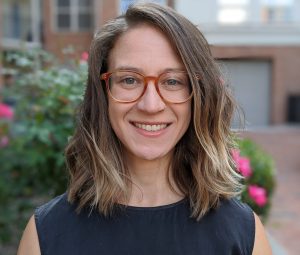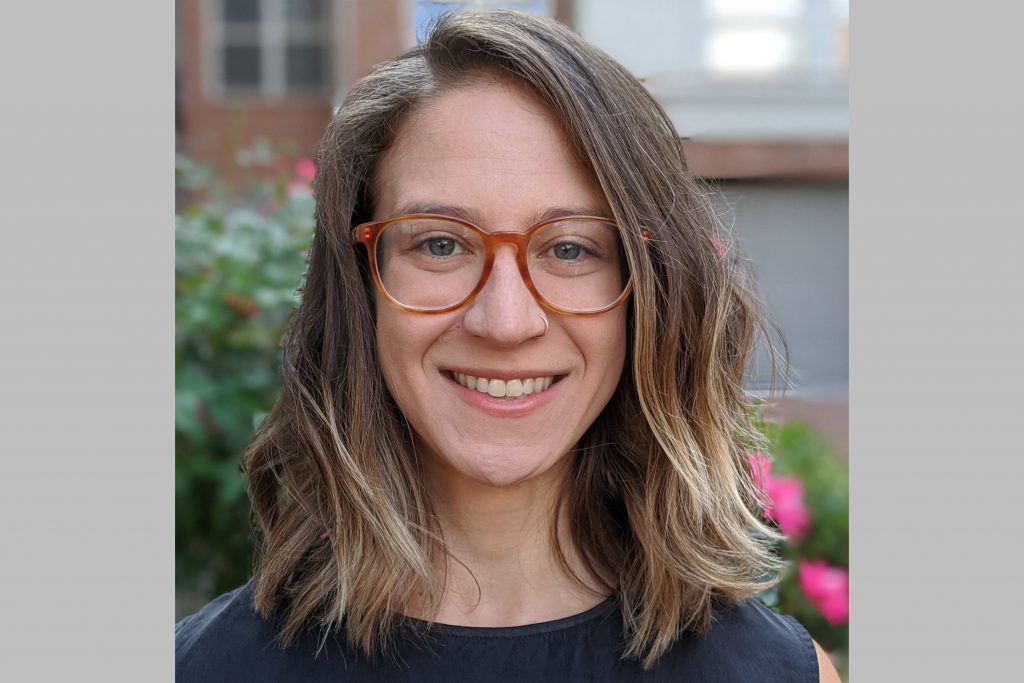We’re taking time to get to know the members of the GSA’s Early Career Scientist Committees. Join us to learn more about our 2020 early career scientist advocates.

Nicole Torosin
Career Development Subcommittee
Institution/Affiliations: Genetics Department, Rutgers University
Career Stage: Postdoc Researcher
Research Interest
I research evolution by comparing and contrasting the DNA of a wide range of species. This approach is useful for figuring out why certain organisms have unique traits while others are shared. For example, for my PhD research, I compared immune genes in howler monkeys to other primates to figure out why howler monkeys are the most susceptible of all primates to yellow fever virus (YFV). Due to a YFV outbreak in 2007–2009, the howler monkey species is now endangered in Brazil and Argentina. As part of my research, I was able to travel to Argentina to collect fecal samples from the surviving population in order to study their DNA! This research was an important step in identifying genetic factors that influence susceptibility to YFV and other viruses in humans and other primates.
While my PhD training focused on laboratory benchwork and field research, my postdoctoral research is focused on bioinformatics. I’m learning to study not just the differences in DNA sequence but the folding patterns of DNA and 3D genome organization. I am currently focused on mapping changes in 3D genome organization across a dozen species of Drosophila. Changes in genome organization affect gene expression and the resulting gene misregulation can cause disease states such as limb malformation and cancer. It has been exciting to use the same principles of comparative genomics on both projects and learn to apply them using different species and methodologies.
As a PhD-trained scientist, you have many career options. What career paths interest you the most?
My passion for research began during my high school years. As a high school student, I had the unique opportunity to pursue an independent research project for three years. At the time I was interested in cloud seeding and spent countless hours at the library researching the topic, in the lab creating a cloud chamber, and figuring out how to best analyze ice crystal formation. I absolutely loved it! This project even led me to a summer internship at the National Center for Atmospheric Research (NCAR). At NCAR I had the opportunity to analyze data from an ongoing cloud seeding campaign in Australia!
When I got to college I was randomly enrolled in a freshman seminar in the anthropology department. I loved it so much I continued enrolling in anthropology courses and soon became interested in the intersection of genetics, evolution, and anthropology. I thought that someday it would be extremely cool to be able to test evolutionary hypotheses using wild primate samples affected by environmental conditions, and confirm the findings using model organisms in the laboratory. Using wild populations takes advantage of naturally-generated variation, while model organisms allow for controlled validation of these observations. My goal is to lead a research team that uses this approach to discover the genetic underpinning of health and disease.
I have been a part of labs in many different fields, and have found that my primary motivation is simply curiosity. Regardless of the topic or field, I constantly have new hypotheses and ideas, and I enjoy doing a deep dive into specific topics and studying them for an extended period of time. I love collaborating on these ideas with others to think about and attack the question from multiple angles. I especially value the opportunity to pass on my passion for scientific inquiry with younger scientists. As a result, academic science has always felt like a natural fit for me.
In addition to your research, how else do you want to advance the scientific enterprise?
Success in academic science relies on adequate leadership and mentorship during training, most importantly from principal investigators (PIs). Without effective mentorship, budding scientists often become frustrated and leave academia or the scientific enterprise in general, resulting in the loss of diverse and valuable ideas and skills.
In order to retain diverse scientists, academia needs to implement prerequisites and training in leadership, mentorship, and management for all incoming PIs. In the current system, not all PIs are educated in how to be an effective leader and mentor. To start changing the academic system, I believe that required instruction and implementation of leadership and management skills should start at the graduate school level and be continued through all tiers of academic science.
During the hiring and job promotion evaluation of PIs, previous training in leadership and management should be used as a metric of success in academics. Lastly, a method for former and current trainees to provide honest, anonymous feedback of their PIs’ management style should be integrated into evaluations, and their feedback strongly considered in the assessment of the PI.
I am now part of an Early Career Leadership Program team that can initiate the creation of programming for leadership and mentorship skill development in graduate school and influence hiring committees to take these qualifications seriously when considering candidates. In this way, future scientists will become effective leaders, managers, and mentors, and in turn improve the overall culture and retention of academic scientists.
As a leader within the Genetics Society of America, what do you hope to accomplish?
As a member of the GSA Early Career Leadership Program, I am committed to communicating the importance of leadership to all early career scientists, sharing resources on how to do so, working to create training opportunities, and making them essential in our academic programs. I joined the GSA Career Development Subcommittee to become more aware of the different career options available to those with a PhD in genetics. While I plan to pursue a career in academia, I want to be more aware of the variety of career options available and be able to share those opportunities with other early career scientists and future trainees. During my time in the GSA Early Career Leadership Program, I am learning about the importance of self-inquiry while navigating career options as well as how to determine ideal career options based on an individual’s long-term goals and available tools to explore, and how to ultimately pursue these careers. These skills will allow me to become a well-rounded and informed mentor and leader.
To become more effective leaders and mentors I believe each of us needs to take responsibility upon ourselves to do the hard work. One way we do this in the Career Development Subcommittee is to host book clubs focusing on growth, leadership, and career development. Through these book club discussions, I am learning how to become a more effective leader. For example, in a recent discussion regarding Reboot by Jerry Colonna, an idea which stuck with me is that the duty of a leader is to take time to understand how their mentees/trainees best learn; there is not a one-size fits all approach that works for everyone.
Previous Leadership Experience
- Student Activity Committee Chair – University of Utah, Salt Lake City, UT
- Science Communication Fellow – Natural History Museum of Utah, Salt Lake City, UT
Connect with Nicole Torosin:































